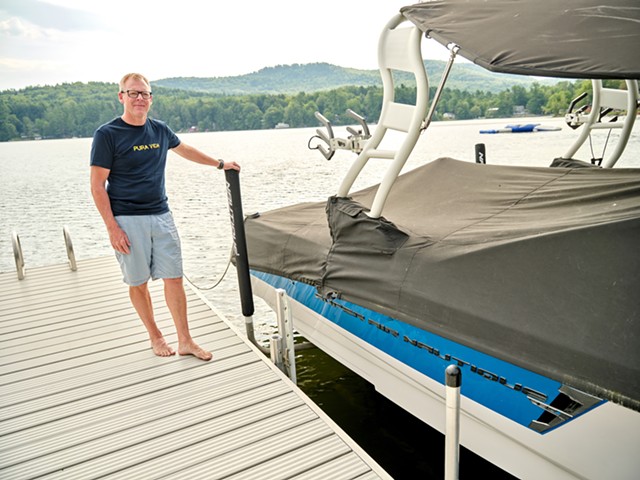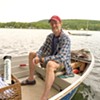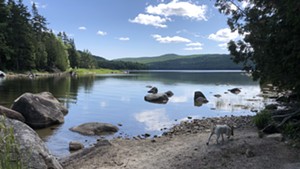
- File: Bear Cieri
- Rodney Putnam and his wake boat on Lake Iroquois
Kim Mackey, a doctor from Wisconsin, owns and enjoys a 450-horsepower wake boat. But he urged regulators this week to keep the powerful craft off Vermont’s lakes and ponds.
Mackey, who has lakeside property in northern Vermont, traveled to a Department of Environmental Conservation hearing on Wednesday to say he wouldn’t want to see the large, loud boats in that setting, where generations of families, linked by shared homes, play in quiet waters.
“Where these boats are used, it will require great regulation and enforcement,” said Mackey, speaking for 19 families, including his, that own property together in Averill.
He described the surface of a lake used by wake boats as a “washing machine."
“We will support restrictions that further limit the number of lakes where these boats can be used at all,” he said.
Wake boats are large, powerful motorboats that are designed to create a wave for surfing. The DEC has been considering new rules for them since last year, when a group called Responsible Wakes for Vermont Lakes called for the state to restrict them to at least 1,000 feet away from the shoreline and to water that is at least 20 feet deep.
The group’s proposal called for the boats to be restricted to larger areas of the 19 lakes that already meet minimum size requirements for personal watercraft such as Jet Skis.
 The DEC held several public hearings and studied the issue for months before releasing a draft of its own rule on January 31. The proposal calls for wake boats to stay at least 500 feet from shore while being used for wake sports, in lakes at least 20 feet deep. Operators would be required to keep their boats in just one lake all year to mitigate the spread of invasive species, unless they had the boat decontaminated by a DEC-approved servicer. The boats would be allowed on 31 lakes.
The DEC held several public hearings and studied the issue for months before releasing a draft of its own rule on January 31. The proposal calls for wake boats to stay at least 500 feet from shore while being used for wake sports, in lakes at least 20 feet deep. Operators would be required to keep their boats in just one lake all year to mitigate the spread of invasive species, unless they had the boat decontaminated by a DEC-approved servicer. The boats would be allowed on 31 lakes.
If approved, Vermont’s rule would be the most restrictive in the country, said Oliver Pierson, manager of the DEC’s Lakes and Ponds Program. This winter and spring, DEC is holding more hearings on its proposal as part of the rulemaking process.
Competition to testify at the first hearing on the DEC proposal, in Greensboro, was intense, prompting Pierson to hold a lottery that selected 60 people to speak for two minutes each. Those who didn’t get a chance were invited to submit written testimony.
Greensboro is home to the quiet Caspian Lake, one of the bodies of water that would be open to wake boats under the proposed rule. Many of the others are also in northern Vermont.
Opinions at the hearing were pointed. Just a few people spoke in favor of the boats; most asked for the rules to be tightened or for the boats to be banned altogether.
“Allowing wake boats in Vermont’s smaller lakes is like someone smoking a cigar in a crowded room; it stinks,” said Katherine Babbott of Thetford Center. She said she looked through boating magazines to learn more about the watercraft. “One of them was described as a ‘wave-making monster,’” Babbott said.
Several people described chaos they’d witnessed after the boats had passed. “I have observed kayakers screaming at wake boats; I have watched paddleboarders being knocked off their boards,” said Richard Gagne, who owns property at Joe’s Pond. “We have a neighbor who does her daily swim with a buoy behind her who has been literally rolled under wakes.”
Opponents of wake boats also cite environmental damage. The boats carry water in ballast tanks; when they are moved from one lake to another, they can spread invasive species.
Members of Responsible Wakes, the lake-users’ group, cite shoreline erosion. And the propellers, which extend deep into the lake when the boat is tipped up, stir up sediment on the bottom, elevating the levels of nutrients such as phosphorus and nitrogen, contributing to algae blooms, said Chris Owen, who owns a camp on Holland Pond. “A wake boat is an eggbeater in shallow water,” Owen said.
Not everyone thinks the DEC should reduce the number of lakes where the boats are allowed. Many people who live on the lakes that would be open to the boats fear they’ll become a haven for the vessels.
“If the rule is enacted as proposed, it would drive boats to only 15 of Vermont’s 800-plus lakes and ponds,” said Candy Moot, who owns a house on Seymour Lake. “We feel a little thrown under the bus.”
Many people also question how wake-boat rules would be enforced. “If a wake boat is operating outside the allowable area, there is no mechanism to enforce the rules,” said June Bascom, who uses Caspian Lake. “Wake boats pose a serious threat. If Vermont is serious about lakeshore and water-quality protection, wake boats must be banned from these waters.”
Mackey uses his wake boat on Wisconsin’s 9,700-acre Lake Mendota, which is more than five miles wide — big enough for wake boaters to enjoy their sport without disturbing others. He said Vermont has no lakes suitable for that purpose. “They are totally disruptive to the entire lake surface,” he said of the craft, which he said "growls like an 18-wheeler."
“Wake boats just don’t have the capacity to cohabitate. They just dominate,” he said. “It’s impossible to be a standup paddleboarder with the wake boat out there doing its job.”
The lake users who testified in support of wake boat use called for more education, not regulation.
Pierson, who has been studying the issue since last summer, said the hearing gave him a lot to think about.
“You can see there has been a bit of a shift in the public’s perception of this issue,” he said, noting that in hearings and comments last year, only about 60 percent supported regulation.
Earlier hearings were in Manchester and Richmond. The Greensboro hearing drew testimony from many people who have ties to northern Vermont lakes — some of them remote, and many free of invasive species.
“It was helpful to hear the strong support for regulation as well as sort of the overwhelming desire for increased regulation beyond what we have proposed,” Pierson said.
As for concerns that limiting wake boats to a few lakes will draw wake boats to those lakes, Pierson was dismissive. “I don’t think human nature is such that everyone is going to start trailering to the 15, 20, 30 lakes that are available in Vermont,” Pierson said. “The vast majority of wake boats are on Lake Champlain, and it’s not covered by this regulation.”
Lake associations can petition for exemptions from DEC rules. A few years after the state passed its quiet lakes rule in 1995, limiting the use of personal watercraft to lakes over 300 acres, two associations, at Great Averill Lake and Caspian Lake, petitioned successfully to be exempted, so the watercrafts are not allowed at those lakes.
But Pierson cautioned that it’s difficult to obtain that kind of exemption. “Because this rule is science-based and quantitative, there would have to be a high bar for us to approve a prohibition” of wake boats, Pierson said.
Disclosure: Anne Wallace Allen's partner owns property on one of the 31 lakes deemed suitable for wake boats in the DEC's draft rule.
Mackey, who has lakeside property in northern Vermont, traveled to a Department of Environmental Conservation hearing on Wednesday to say he wouldn’t want to see the large, loud boats in that setting, where generations of families, linked by shared homes, play in quiet waters.
“Where these boats are used, it will require great regulation and enforcement,” said Mackey, speaking for 19 families, including his, that own property together in Averill.
He described the surface of a lake used by wake boats as a “washing machine."
“We will support restrictions that further limit the number of lakes where these boats can be used at all,” he said.
Wake boats are large, powerful motorboats that are designed to create a wave for surfing. The DEC has been considering new rules for them since last year, when a group called Responsible Wakes for Vermont Lakes called for the state to restrict them to at least 1,000 feet away from the shoreline and to water that is at least 20 feet deep.
The group’s proposal called for the boats to be restricted to larger areas of the 19 lakes that already meet minimum size requirements for personal watercraft such as Jet Skis.
Related Opponents of Wake Boats Seek New Rules, Roiling Lake Communities

Opponents of Wake Boats Seek New Rules, Roiling Lake Communities
Environment
If approved, Vermont’s rule would be the most restrictive in the country, said Oliver Pierson, manager of the DEC’s Lakes and Ponds Program. This winter and spring, DEC is holding more hearings on its proposal as part of the rulemaking process.
Competition to testify at the first hearing on the DEC proposal, in Greensboro, was intense, prompting Pierson to hold a lottery that selected 60 people to speak for two minutes each. Those who didn’t get a chance were invited to submit written testimony.
Greensboro is home to the quiet Caspian Lake, one of the bodies of water that would be open to wake boats under the proposed rule. Many of the others are also in northern Vermont.
Opinions at the hearing were pointed. Just a few people spoke in favor of the boats; most asked for the rules to be tightened or for the boats to be banned altogether.
“Allowing wake boats in Vermont’s smaller lakes is like someone smoking a cigar in a crowded room; it stinks,” said Katherine Babbott of Thetford Center. She said she looked through boating magazines to learn more about the watercraft. “One of them was described as a ‘wave-making monster,’” Babbott said.
Several people described chaos they’d witnessed after the boats had passed. “I have observed kayakers screaming at wake boats; I have watched paddleboarders being knocked off their boards,” said Richard Gagne, who owns property at Joe’s Pond. “We have a neighbor who does her daily swim with a buoy behind her who has been literally rolled under wakes.”
Opponents of wake boats also cite environmental damage. The boats carry water in ballast tanks; when they are moved from one lake to another, they can spread invasive species.
Members of Responsible Wakes, the lake-users’ group, cite shoreline erosion. And the propellers, which extend deep into the lake when the boat is tipped up, stir up sediment on the bottom, elevating the levels of nutrients such as phosphorus and nitrogen, contributing to algae blooms, said Chris Owen, who owns a camp on Holland Pond. “A wake boat is an eggbeater in shallow water,” Owen said.
Not everyone thinks the DEC should reduce the number of lakes where the boats are allowed. Many people who live on the lakes that would be open to the boats fear they’ll become a haven for the vessels.
“If the rule is enacted as proposed, it would drive boats to only 15 of Vermont’s 800-plus lakes and ponds,” said Candy Moot, who owns a house on Seymour Lake. “We feel a little thrown under the bus.”
Many people also question how wake-boat rules would be enforced. “If a wake boat is operating outside the allowable area, there is no mechanism to enforce the rules,” said June Bascom, who uses Caspian Lake. “Wake boats pose a serious threat. If Vermont is serious about lakeshore and water-quality protection, wake boats must be banned from these waters.”
Mackey uses his wake boat on Wisconsin’s 9,700-acre Lake Mendota, which is more than five miles wide — big enough for wake boaters to enjoy their sport without disturbing others. He said Vermont has no lakes suitable for that purpose. “They are totally disruptive to the entire lake surface,” he said of the craft, which he said "growls like an 18-wheeler."
“Wake boats just don’t have the capacity to cohabitate. They just dominate,” he said. “It’s impossible to be a standup paddleboarder with the wake boat out there doing its job.”
The lake users who testified in support of wake boat use called for more education, not regulation.
Pierson, who has been studying the issue since last summer, said the hearing gave him a lot to think about.
“You can see there has been a bit of a shift in the public’s perception of this issue,” he said, noting that in hearings and comments last year, only about 60 percent supported regulation.
Earlier hearings were in Manchester and Richmond. The Greensboro hearing drew testimony from many people who have ties to northern Vermont lakes — some of them remote, and many free of invasive species.
“It was helpful to hear the strong support for regulation as well as sort of the overwhelming desire for increased regulation beyond what we have proposed,” Pierson said.
As for concerns that limiting wake boats to a few lakes will draw wake boats to those lakes, Pierson was dismissive. “I don’t think human nature is such that everyone is going to start trailering to the 15, 20, 30 lakes that are available in Vermont,” Pierson said. “The vast majority of wake boats are on Lake Champlain, and it’s not covered by this regulation.”
Lake associations can petition for exemptions from DEC rules. A few years after the state passed its quiet lakes rule in 1995, limiting the use of personal watercraft to lakes over 300 acres, two associations, at Great Averill Lake and Caspian Lake, petitioned successfully to be exempted, so the watercrafts are not allowed at those lakes.
But Pierson cautioned that it’s difficult to obtain that kind of exemption. “Because this rule is science-based and quantitative, there would have to be a high bar for us to approve a prohibition” of wake boats, Pierson said.
Disclosure: Anne Wallace Allen's partner owns property on one of the 31 lakes deemed suitable for wake boats in the DEC's draft rule.






Comments
Comments are closed.
From 2014-2020, Seven Days allowed readers to comment on all stories posted on our website. While we've appreciated the suggestions and insights, right now Seven Days is prioritizing our core mission — producing high-quality, responsible local journalism — over moderating online debates between readers.
To criticize, correct or praise our reporting, please send us a letter to the editor or send us a tip. We’ll check it out and report the results.
Online comments may return when we have better tech tools for managing them. Thanks for reading.